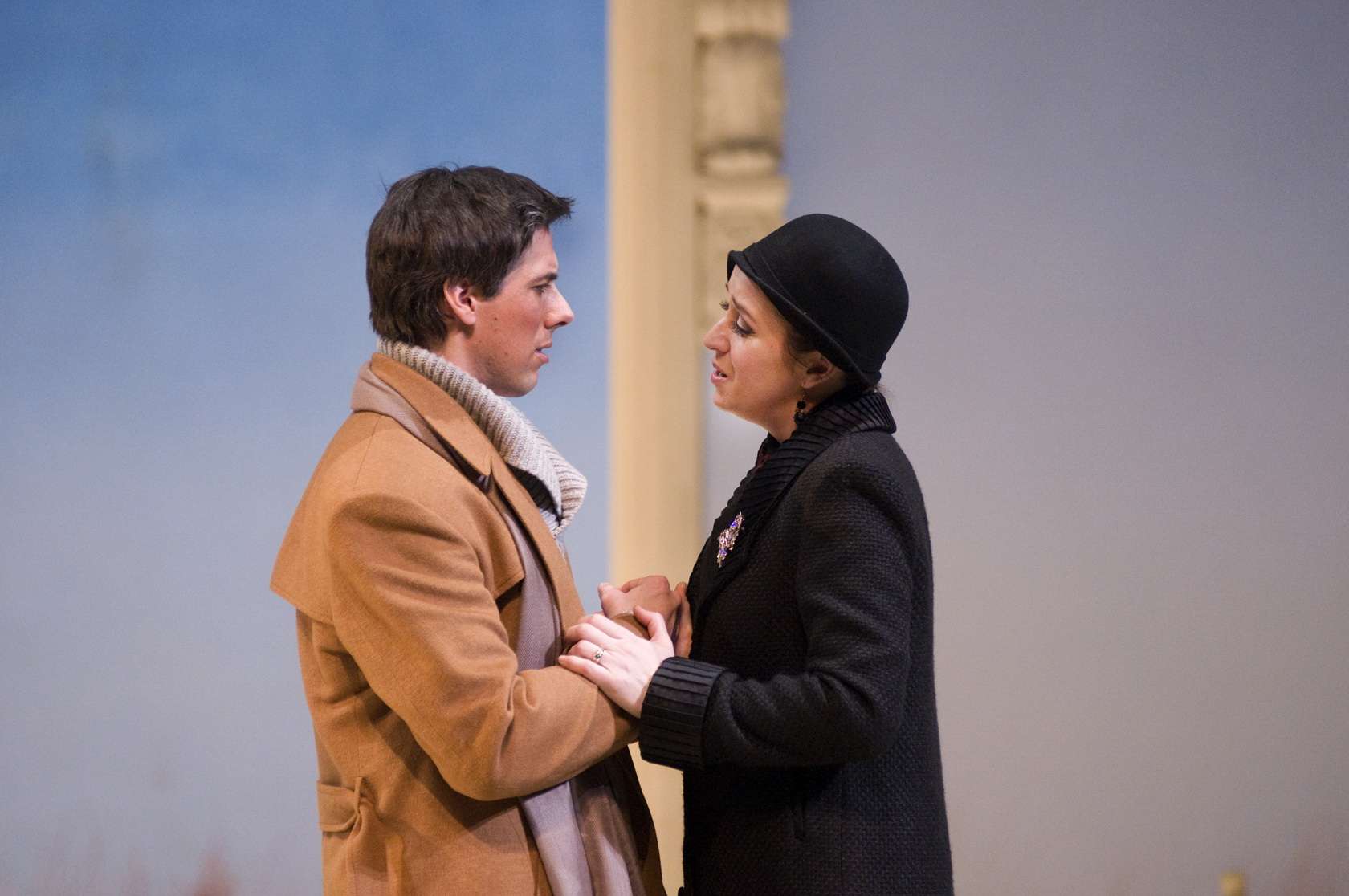|
Back
Werther in the Outback? Montréal
Salle Wilfrid Pelletier, Place des Arts
01/22/2011 - & January 26, 29, 31, February 3, 2011
Jules Massenet: Werther
Phillip Addis (Werther), Michèle Losier (Charlotte), Stephen Hegedus (Albert), Suzanne Rigden (Sophie), Alain Coulombe (The Bailiff), Riccardo Ianello (Schmidt), Normand Richard (Johann), Pierre Rancourt (Brühlmann), Karine Boucher (Kätchen)
Orchestre symphonique de Montréal, Jean-Marie Zeitouni (conductor); Les Petits chanteurs du Mont-Royal, Gilbert Patenaude (preparation); Les Voix boréales, Philippe Ostiguy (preparation); and FACE (Fine Arts Core Education) High School, Xavier Brossard Ménard (preparation)
Christopher Dawes for Elijah Moshinsky (director), Alain Gauthier (assistant director), Michael Yeargan (set designer), Barilà (costumes), Anne-Catherine Simard-Deraspe (lighting), Esther Gonthier (rehearsal pianist)

P. Addis & M. Losier (© Yves Renaud/Courtesy OdM)
Opéra de Montréal (OdM) served up an uneven production of Jules Massenet’s Werther for its third offering of the 2010-11 season. The Company mounted the tenor version twice before, in 1982 and 1994. This time OdM chose the version for baritone. Massenet created this in 1902, ten years after the premiere of the tenor version, for the famous Italian baritone Mattia Battistini. Although some may be disappointed in not hearing the immortal aria, "Pourquoi me réveiller", in its original form, the baritone voice can offer a warm, golden luster to this aria that should melt any resisting heart. For the OdM production, conductor Jean-Marie Zeitouni even reworked Massenet’s baritone part — according to the program notes — "to best conform to Phillip Addis’ voice, which is more developed in the higher range".
A strange thing to say. If Addis’ voice is more developed in the higher range, perhaps he should have been singing the tenor arrangement. I found, however, his voice shrill and high-pitched in the upper register. Conversely, his lower register is solidly based, full of warmth and richness of color. Addis is more comfortable and convincing singing in this range.
The production opens onto an ingenious cut-away of a large, high, almost bare room of a house. Grecian pilasters and entablatures grace the upper frames of the doors in the middle of each of the three semi-transparent walls. I had the impression that the opera was set in the American mid-west of the 1930s (a field of wheat directly outside the door, a kid in overalls pumping up a tire of an old-fashioned bicycle). But it must have been set in the outback of Australia, as the production originated with Opera Australia. What gives this set a twist is that the outdoors has invaded the room, which is populated with outdoor wicker furniture, the bicycle, etc. The sparseness of the set and the changing pale red, blue and green colors on the walls produce a light, dream-like quality — a befitting foil for the emotional turmoil of the principal characters. Enchanting, ethereal and it works.
Werther is a complex masterpiece. Its emphasis on the reflective human psyche looks toward Debussy and even Berg. Its orchestral richness comprises myriad changes in key, tempo, tessitura and tonal color. The young, Montréal-born Jean-Marie Zeitouni, (incidentally, the newly-appointed conductor of the Columbus Symphony) drew a deft performance from the Orchestre symphonique de Montréal in the pit. Working against this, however, was a lack of appropriate stage direction and less than adequate acting ability of the principal performers. This resulted in a stolid, pedestrian performance which lacked tension and drama, especially in the first two acts.
During these acts both Addis as Werther and Michèle Losier as Charlotte disappointed. Addis was straining in the higher register and Losier, who sang the role in the 2009 Australian production, came across as wooden and characterless. The standouts in the first half were the comprimario roles. Alain Coulome, as the bailiff, was superb. He delivered a velvety, well-rounded baritone that could serve as a benchmark for aspiring singers. Stephen Hegedus, as Albert, although confined to a rather frigid, one-dimensional character, was well focused with a spot-on pitch. Suzanne Rigden, a student with OdM’s highly successful Atelier lyrique de l’OdM, performed Sophie with a lightness of touch and a bright, ringing tone. Normand Richard as Johann and Ianello Riccardo as Schmidt lent the appropriate humor with panache and gusto.
Someone must have read the riot act during the second intermission (during which I saw quite a few people leave), for the production began to coalesce in Act III. The set now comprised a haute-bourgeois interior replete with contemporary furniture, including two over-sized, enclosed bookcases, a dining table set for a Christmas Eve dinner (instead of the piano that Massenet wrote into the action?), a minimalist sofa and servants. Quite a spread for a country bailiff! (The attractive evening gowns of the female dinner guests, designed by Montreal’s Barilà Clothing, were back in 1930s’ style.) Losier suddenly revealed a strong character and voice in her monologue and aria, "Qui m’aurait dit la place … Va! Laisse couler mes larmes", and Addis succeeded splendidly in "Pourquoi me réveiller". The orchestra offered nuanced support, a fine saxophone solo and luxurious interludes.
For the short, final act the set revolved 180 degrees to reveal dingy, student quarters where Werther lay on the floor apparently dead. His sudden revival solicited laughs from many around us, and it did seem when he was walking around the room that he’d never die. But die he does, and to our relief, the somewhat unsatisfactory production also came to an end.
Earl Arthur Love
|